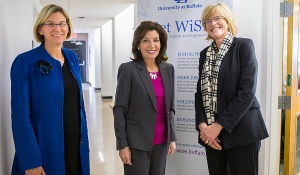Flexibility, Initiative, Courage
A Conversation with Dean Robin Schulze

Robin Schulze, dean of the College of Arts and Sciences (right) and Liesl Folks, dean of the School of Engineering and Applied Sciences (left) with Lt. Governor Kathy Hochul at a WiSE event.
Published October 17, 2017 This content is archived.
By Elin Hawkinson
Ask Google What should I study in college? and in less than a second, it will yield over 300,000,000 results. The speed of this technology is staggering, but if you ask Robin Schulze, PhD, the new dean of UB’s College of Arts and Sciences, it’s also wildly misleading.
“It takes time, effort and patience to discover your passion,” she says. “But when you discover your passion, you discover the problems you want to solve.”
Passion is easy to observe when speaking with Schulze, quickly followed by intelligence, enthusiasm, determination and a sense of humor. Each of these qualities helped to buoy her through a difficult period when a hand injury cut short her promising musical career. She forged ahead, attending Yale undergrad, acquiring two master’s degrees and a doctorate, then publishing four books and dozens of scholarly articles.
Internationally recognized for her expertise in modernist poetry, Schulze has received grants from UNIDEL, the American Philosophical Society and the Oregon State University Center for the Humanities, among others. Before accepting her position at UB, she held high-level administrative roles at Penn State and the University of Delaware. She now oversees the massive CAS system of 27 departments, 16 academic programs and 23 centers and institutes.
To what does she credit her present success? A degree in liberal arts, Schulze says. “If a student asks: ‘What does a degree in liberal arts get me?’ I say it gets you critical reading skills. Communication skills. Writing skills. It gets you flexibility, initiative and courage.”
It’s these same skill sets she turns to whenever life throws a curve ball, and, she adds, they’re the pot of gold every liberal arts student should seek. “Our students learn to meet the world as it exists today, then imagine better for tomorrow,” Schulze explains. “They look through multiple lenses. They practice empathy. This is how we produce leaders.”
Schulze feels fortunate to have attended school in a time when more students were encouraged to find a purpose, rather than just employment. “Students today are rarely told they can be successful if they follow the paths that excite them,” she says. “That’s a problem we need to address, and it’s why the UB curriculum celebrates the joy of intellectual discovery. In the College of Arts and Sciences, you can study anything. We ready our students to become active, passionate citizens in a diverse and dynamic global community.”
Recently, Schulze visited with Joel Lunenfeld, class of ’99. Lunenfeld, now the vice president of global brand strategy for Twitter, studied anthropology at UB. The leap from anthropology to brand strategist may seem expansive, but according to Schulze it’s a perfect example of the unlimited possibilities open to savvy liberal arts grads.
“The workforce is evolving rapidly and students need to understand that the job they will have may not exist yet, that they are the ones who’ll define their positions,” she says. “To be competitive, they must think of the future as a moving target, and be prepared to set new expectations for themselves and their careers.”
Wisely preparing for this type of job market takes hard work on the part of the student. Schulze mentions “grit,” a concept defined by Angela Duckworth that values persistence, resilience and willpower. Schulze believes it’s more important now than ever that students develop these traits and prepare themselves for life after college while they’re still enrolled.
“We offer a wide range of professional development and support at UB,” she says with pride. “Students should take advantage of our study abroad programs and partnerships with research faculty. They should connect with our College Ambassadors and go to their professors’ office hours. Why wait until senior year to visit Career Services? Go today.”
Schulze also has a message for the students who fear their degree won’t translate into marketability. She references a recent survey that reports “broad learning” was chosen by 85% of employers as the most significant marker of long-term career success. Broad learning includes teamwork; ethical judgment and decision making; and the ability to apply knowledge to the real world — the bedrock of a solid liberal arts education.
“It’s this focus on holistic achievement that serves to underline UB’s status as a first-class, world-class institution, and a leader in national and international education initiatives,” Schulze says.
A broad learning curriculum contributes to the value of a UB education, already top-ranked for affordability. Additionally, UB students receive among the highest percentage of gift aid and educational loans in the country. Schulze is committed to keeping education affordable for every student, meaning that she is also committed to their success once they leave UB.
“Our students come to Buffalo because they know it’s how they will access their potential,” Schulze says. “They succeed here because they believe in themselves. We believe in them because we know that when a UB student succeeds, they change the world.”